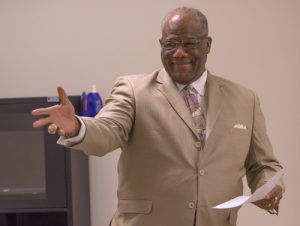Martin University pulls new president from staff at UIndy
After conducting a national search, the black liberal arts college on Indianapolis’ east side has hired a diversity and inclusion officer at UIndy to replace outgoing leader Eugene White.
After conducting a national search, the black liberal arts college on Indianapolis’ east side has hired a diversity and inclusion officer at UIndy to replace outgoing leader Eugene White.

White, a former superintendent of Indianapolis Public Schools, was hired in 2013 to put the university on surer footing. The black liberal arts college on the city’s east side had seen a string of presidents come and go since the retirement of its co-founder in 2007.
Eugene White, the president of Martin University, had become restless in retirement when the opportunity to lead the struggling black liberal arts college surfaced.
The bidding for the Super Bowl has become so hyper competitive, cities have become super secretive about their bids. Indianapolis officials on Monday are promising to unveil one of their secret weapons in the city's bid to win the 2018 game.
The IPS board has chosen Lewis Ferebee from North Carolina to replace Eugene White, who led IPS for nearly eight years. The 39-year-old Ferebee has been chief of staff in the Durham Public Schools district, roughly the same size as IPS.
Indianapolis Public Schools has narrowed its search for a superintendent to three out-of-state candidates who have never served as the top leader at a school district before.
What if we had a public school system the entire city could be proud of?
The Indianapolis Public Schools board will vote Tuesday night to hire Peggy Hinckley, former superintendent of Warren Township schools, as interim superintendent to replace Eugene White.
Eugene White is a towering man with an outsized personality to match. When he took the helm of the troubled Indianapolis Public Schools seven years ago, he seemed to have the confidence and determination to steamroll through the changes the district badly needed.
The embattled superintendent of the Indianapolis Public Schools says he's retiring from the state's largest school system on April 5. Eugene White announced the move to the IPS board Tuesday night.
Eugene White has led Indianapolis Public Schools for seven years. His planned departure follows the recent election of reform-minded school board candidates who have questioned whether he is the right leader for the district.
A slight majority of more than 7,000 residents in the Indianapolis Public Schools district are dissatisfied with the school system, according to surveys conducted in late summer by a coalition of community groups, including IPS itself.
The proposed cuts represent about 5 percent of Indianapolis Public Schools’ current budget. IPS Superintendent Eugene White will detail his spending-reduction plan on May 24 at the IPS’ central office building.
In most ventures, competition is so vital it’s illegal to restrict it.
Some proponents of the Mind Trust plan to restructure Indianapolis Public Schools are looking to advance its key principles the old-fashioned way: by electing pro-reform members to the IPS board.
Indianapolis Public Schools chief Eugene White projected a defiant tilt toward the status quo.
IPS superintendent Eugene White had been among the finalists for the top jobs at schools systems in Mobile, Ala., and in Greenville, S.C. But both districts chose this week to appoint internal candidates to lead their school systems.
If Eugene White leaves Indianapolis Public Schools—maybe not so coincidentally near Jason Kloth’s April 1 move into the City-County Building—the city has an even better opportunity to signal it’s a place where reform-minded educators can thrive.
Eugene White, superintendent of Indianapolis Public Schools, is now a finalist to lead a school system in Mobile County in Alabama, and he is interviewing for another superintendent’s post in South Carolina.
The Mind Trust plan for transforming Indianapolis Public Schools calls for turning the district into a network of charter-like schools and giving them 15 percent to 25 percent more dollars to spend than Indianapolis charter schools currently enjoy.